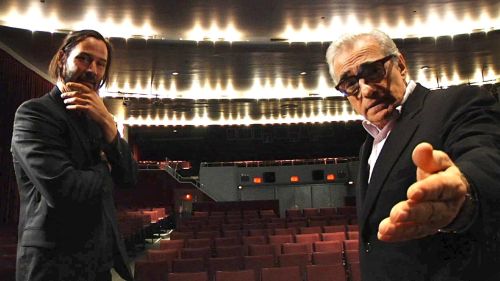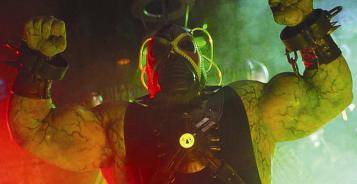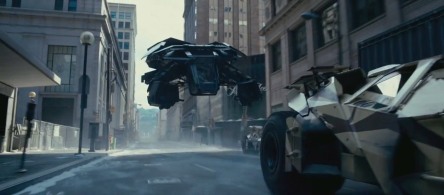If I’m to understand this correctly, California is the only American state right now not crippled by unnaturally cold February weather. And it’s a good thing too, or this weekend’s Oscars would feature 90 very unpleasant minutes on the white carpet, and those of us on the East Coast wouldn’t have good excuses to hide inside from the snow on a Sunday night.
So yes, it’s Academy Awards time again, that one magical time of the year where everyone cares as much about movies as I do. The theme for this year’s show is “Neil Patrick Harris finally gets to host the Oscars”, so there’s a lot of pressure on the Starship Troopers star to make sure MC stands for ‘most charming’.
Twelve months on from 12 Years a Slave’s deserved win, and 12 years are again a major contender – this time the 12 years of Mason Evans’s life in Boyhood. Richard Linklater’s film is surprisingly lo-fi for a Best Picture contender, but the scope of its production makes it that one-of-a-kind film the Academy occasionally like to acknowledge. But it’s not quite a given yet, with the likes of Birdman, The Grand Budapest Hotel and the struggling British scientist twins Hawking and Turing all viable contenders. There’s been a notable best picture/director split the last two years, also, and although Interstellar has been denied the role of this year’s Gravity, there’s still a good chance of the top film of the night won’t walk away with all the gold.
The big event no one is talking about is The Sound of Music 50th anniversary something-or-other we’re all going to be subjected to because AMPAS have officially run out of ideas for how to throw a party. The only way it’s going to be truly entertaining is if they just play this clip on a loop for five minutes.
Anyways, where was I?
Best Picture
Only eight nominees this time around? What does that say about the movies in 2014? And what was the point of the whole Dark Knight-inspired revival of up to 10 nominees if Interstellar was gonna get shut out? And where the hell is Nightcrawler on this list? Boyhood has all the prestige in its pocket, but it also comes with plenty of fatigue given its summer release and the endless parade of praise since its Sundance debut more than a year ago. It’s a deserving winner though, and it’s hard to pick out a true opponent. Birdman is just that bit too out there to take the prize, and Grand Budapest Hotel suffers from both fatigue and over-whimsy. The Imitation Game and The Theory of Everything would almost be shoe-ins in their own years (although the latter is a far more affecting film than the rather flaccid Turing tale), but I suspect they cancel one another out. Whiplash is terrific, but its real-world appeal is utterly overshadowed by Boyhood’s. American Sniper has courted so much ire and controversy it’s hard to see it taking the top prize, but then I remain astonished it was nominated in the first place – it has to be the weakest BP nominee since Extremely Loud and Incredibly Close. Selma follows a Black History winner last year, and despite some superbly staged scenes just cannot live up to 12 Years; it’s a worthy nominee, but not a deserving a winner.
Should win: Boyhood or Whiplash
Will win: Boyhood
Best Director
Bennett Miller (Foxcatcher) and Morten Tyldum (The Imitation Game) are the placeholders here, while a win for Wes Anderson would be more a career achievement prize than a win for GBH. Really it’s between Alejandro González Iñárritu and Linklater. Iñárritu has energy behind him after Alfonso Cuarón’s win last year, ut really it’s hard to imagine Linklater not taking this home for committing twelve years to such an ambitious and personal project.
Should win: Richard Linklater or Bennett Miller
Will win: Richard Linklater
Best Actor
This one will go down to the very last vote. Michael Keaton has made an astonishing career comeback with Birdman, and it’s hard to know if he has another performance of this quality in him. But the astonishing physicality of Eddie Redmayne’s take on Stephen Hawking, which pushed through impression into a remarkably affecting conjuring of the scientist, is the sort of prestige performance the Academy adores. Steve Carell, Benedict Cumberbatch and Bradley Cooper can all sit this one out.
Should win: Michael Keaton or Eddie Redmayne
Will win: Eddie Redmayne
Best Actress
Julianne Moore seems anointed for Still Alice, although the film escaped me this awards season. Of the three performances I did catch, of Marion Cotillard, Rosamund Pike and Felicity Jones, all were stellar, although Jones did not completely carry her movie as the other two did.
Should win: Marion Cotillard or Rosamund Pike (but probably Julianne Moore?)
Will win: Julianne Moore
Best Supporting Actor
Robert Duvall gets his pat on the back for still being with us and wonderful. Ethan Hawke wins the award for most eternally youthful, so doesn’t need an Oscar. Ed Norton gave one of the finest (and most entertaining) performances of his career in Birdman, while Mark Ruffalo was solid throughout Foxcatcher. But yeah, why am I still writing here? J.K. Simmons dominated Whiplash. This is all his.
Should win: J.K. Simmons
Will win: J.K. Simmons
Best Supporting Actress
Emma Stone would be a deserving winner for Birdman, but something tells me (and I think everyone else) that she has a lot more performances of this quality in her. Patricia Arquette, on the other hand, deserves this on the power of her final scene in Boyhood alone, in which she summons millennia of forgotten, neglected womanhood and channels it into a wail lightly tinged with ironic wit.
Should win: Patricia Arquette
Will win: Patricia Arquette
Best Original Screenplay
This is a tight one too. It would seem unfair for Linklater to take this, given the script was worked so much on the fly. Anderson has lost momentum too, and assumedly his script says “[funny cameo]” one too many times for it to be taken too seriously. Dan Gilroy’s screenplay for Nightcrawler is one of the most brilliantly dark works to come out of Hollywood in years, but it’s so scathing of the entertainment business it’s hard to imagine it getting a bite. The Birdman gang, whose praise for real artists is found on every page, will take this.
Should win: Dan Gilroy
Will win: Alejandro González Iñárritu, Nicolás Giacobone, Alexander Dinelaris, Jr. and Armando Bo
Best Adapted Screenplay
Whiplash would be a very deserving winner here, as would Paul Thomas Anderson, whose Inherent Vice, however incoherent at times, is loaded with punchy scenes and dialogue. This could be where American Sniper takes it, but somehow I suspect Graham Moore’s (lacklustre) screenplay for The Imitation Game will win for simplifying so much complicated science in the manner of a tour guide at Bletchley Park.
Should win: Damien Chazelle
Will win: Graham Moore
Best Animated Feature

Bewilderbeasting: A satirical cartoon depicting DreamWorks pressuring the Academy to vote for their shitty sequel
Why even bother? The Tale of the Princess Kaguya, assumedly Isao Takahata’s swansong, was probably the finest film of 2014. It’s hard to believe any of the Academy’s members even watched it. Song of the Sea was equally as enchanting if not quite as deep or visually mesmerising. But that’s all irrelevant. DreamWorks have shovelled out enough money to claim it for the bog-standard How to Train Your Dragon 2 (a film whose predecessor was superior to Oscar-winner Toy Story 3, back in the day). Likely to be the biggest farce of the night.
Should win: The Tale of the Princess Kaguya
Will win: How to Train Your Dragon 2
Best Animated Short
I’ve only seen Feast so I’m guessing Feast because I want a puppy and now I’m hungry.
Should win: Feast
Will win: Feast
Best Foreign Language Film
Embarrassingly I have only seen Ida of this batch, but it is magnificent. I have yet to read a review of Leviathan that wasn’t overflowing with praise, but really this can only go to Ida, if only for proving that the Holocaust can still be mined for the most exceptional drama.
Should win: Ida
Will win: Ida
Best Documentary Feature
Two warzone films (Last Days in Vietnam and Virunga). Two photographer films (Finding Vivian Maier and The Salt of the Earth). And then there’s the astonishing and frighteningly potent Citizenfour. Maier is the only real competition, but as incredible as its subject is the film itself is very blandly thrown together. Citizenfour on the other hand grips like a thriller and chills like a horror. We have to trust the Academy on this one.
Should win: Citizenfour
Will win: Citizenfour
Best Documentary Short
I promise one of these years I’ll see one of these, OK?
Best Live Action Short
Ugh now you’re just trying to make me feel bad.
Best Original Score
What is the sound of science? The big competitors here are Interstellar (Hans Zimmer), The Imitation Game (Alexandre Desplat), and The Theory of Everything (Jóhann Jóhannsson). Criminally locked-out of the major categories, Mr. Turner appears here for Gary Yershon’s score, but like Desplat’s Grand Budapest Hotel score both were less memorable in the face of such exquisite visuals.
Should win: Hans Zimmer or Jóhann Jóhannsson
Will win: Jóhann Jóhannsson
Best Original Song
Hey did you notice how I managed not to piss and moan about The Lego Movie getting cut out of Best Animated Feature? Well now I’m gonna! Because that was bullshit. But just because it was cut out does not mean it should be patronised with a bonus Oscar elsewhere. ‘Everything Is Awesome’ is amazing fun, but musically and thematically John Legend and Common’s ‘Glory’, from the also largely overlooked Selma, is probably the more deserving winner.
Should win: ‘Glory’
Will win: ‘Everything Is Awesome’
Best Sound Editing
Hey look the third Hobbit movie got a nomination for something! But no seriously fuck that movie. Birdman gets this.
Should win: Birdman
Will win: Birmdan
Best Sound Mixing
Oh right! The other sound one! This will be tight between Birdman and Whiplash, but I suspect the former has it as it goes for a minor technical sweep.
Should win: Birdman or Whiplash
Will win: Birdman
Best Production Design
I’m sure I’ve made it very clear I am no fan of Wes Anderson’s latest, but even I think it would be criminal to let The Grand Budapest Hotel be beaten here, unless it was by the sensational Mr. Turner. But no, give it to Adam Stockhausen and Anna Pinnock, seriously.
Should win: The Grand Budapest Hotel or Mr. Turner
Will win: The Grand Budapest Hotel
Best Cinematography
Emmanuel Lubezki’s work on Birdman was that film’s greatest draw, but with a win for Gravity last year and up against the likes of Grand Budapest, Ida, and Mr. Turner it’s hard to just hand it to straight to him. But the Academy will.
Should win: Emmanuel Lubezki, Łukasz Żal and Ryszard Lenczewski (Ida), or Dick Pope (Mr. Turner)
Will win: Emmanuel Lubezki (Birdman)
Best Makeup and Hairstyling
Steve Carell’s nose takes on Dave Bautista’s full-body tattoos. You just never know which way the Academy will go. I suspect the tremendous goodwill towards Guardians of the Galaxy will see it through.
Should win: Guardians of the Galaxy
Will win: Guardians of the Galaxy
Best Costume Design
This is the sort of place outsiders like Mr. Turner or Into the Woods could sneak one through. Even Maleficent got a nod here. If we take it the fairytales cancel one another out, that throws the period dramas up against one another. Inherent Vice could take it for cool, but I’d put my money on another win for the look of Grand Budapest Hotel
Should win: Inherent Vice
Will win: The Grand Budapest Hotel
Best Film Editing
There’s only two choices here: Whiplash for rhythm, or Boyhood for scope. If Boyhood doesn’t take this early, the rest of the night could go very differently to what’s expected, and you may then dismiss the entirety of this article.
Should win: Whiplash
Will win: Boyhood
Best Visual Effects
This is like making me choose between my children. I cannot remember the last time I would be delighted for any of the nominees to win. Captain America: The Winter Solider – fantastic. Dawn of the Planet of the Apes – fantastic. Guardians of the Galaxy – fantastic. Interstellar – fantastic. X-Men: Days of Future Past – fantastic. Not only are they great effects films, but they’re also probably the five best blockbusters of last year, with films like Transformers 4 and The Hobbit 3 getting deservedly cut. I dunno, I just want to congratulate the winner and move on.
Should win: Guardians of the Galaxy or Interstellar
Will win: Guardians of the Galaxy
And that’s all there is. I wish I could predict which winners will be booed or orchestra’d off the stage, but that’s a very different kind of Oscar prediction. We’ll know around this time tomorrow night anyways… See you back here then!








































